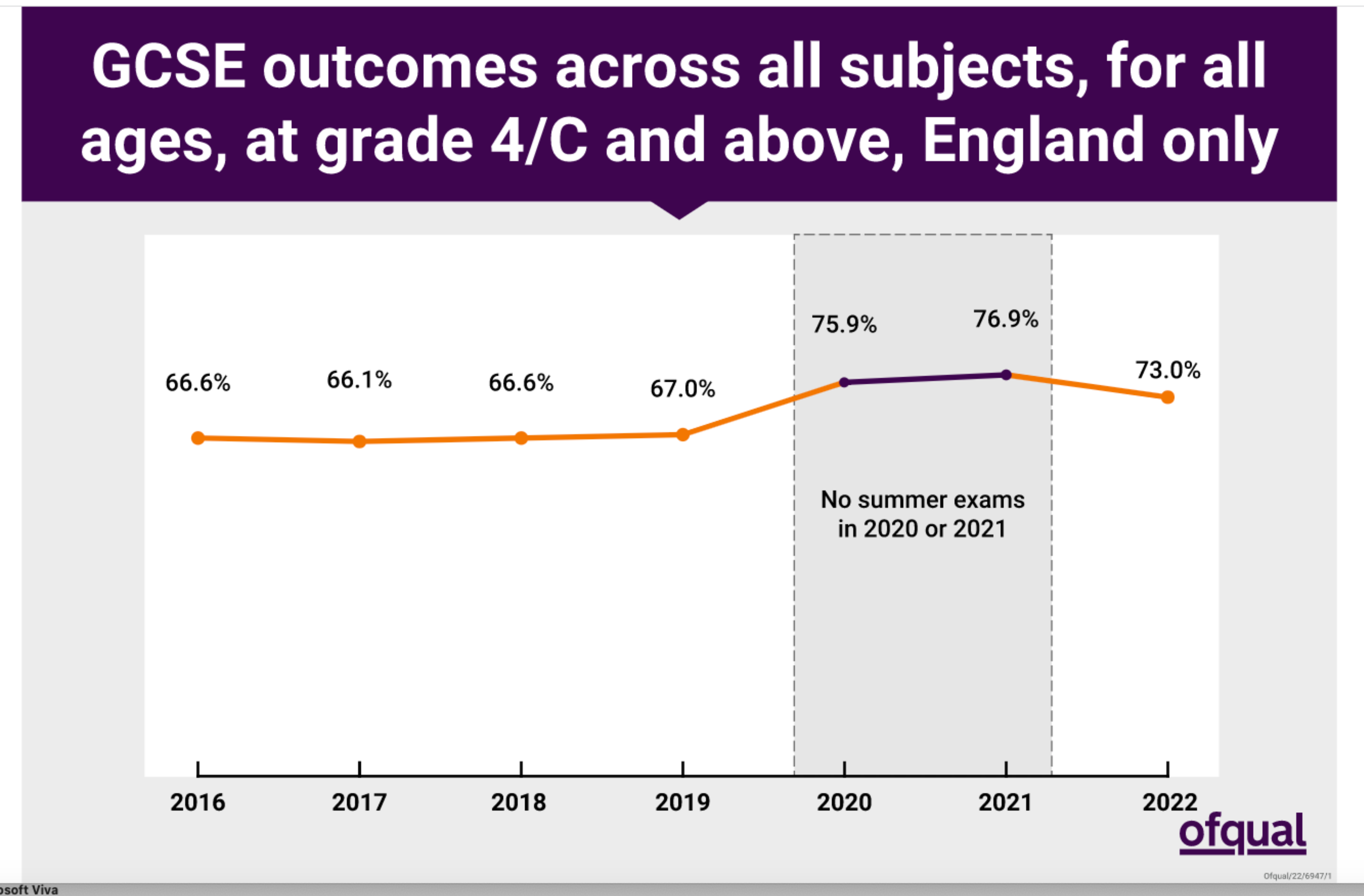The Elastik team took a deep-dive into the 2022 GCSE results to bring you the highlights – and suggest what they might mean for your school and education more widely.
How did the results live up to regulator forecasts?
There were sighs of relief last week as the GCSE results were announced in the UK.

Despite lower grades being ‘part of the plan’ according to the Minister of State, Will Quince, this year’s outcomes remain considerably higher than 2019.
This was the case for the standard pass (grade 4) and higher grades of 7 and above.
First thoughts are for the pupils and teachers who have a moment of relief and pride after what has been a very challenging time.
But now the happy tears have been wiped away and the last slice of celebratory cake has been eaten, let’s take a closer look at the results and the challenges that they point to for schools and educators.
Maths and English behind target
The big story in Maths has been Derek Skipper passing his GCSE at 92. Congratulations Derek!
However, there are some fewer heartwarming insights in the 2022 GCSE data.
Despite the Government’s ambitious 2022 white-paper goals to improve average grades in English and Maths at all levels, almost a third of pupils still did not achieve a standard pass (Level 4, in English and Maths) with comparable outcomes playing a part. Good GCSE grades in Maths and English are crucial for academic progression and employability. These students will need to continue studying until they pass or reach the age of 18.
For those looking to re-sit these subjects, the 2022 resits pass rates will be a cause for concern. In contrast to the overall trend, grades fell dramatically, coming in lower than 2019 levels. We know this to be the case given the summer exam results from 2021 and the result of higher pass rates that year.
In English, fewer than a third of students (28.4%) were awarded grade 4 or above compared to 31.9% in 2019 and 34.2% the previous year.
In Maths, the pass rate was even lower, at 20.1% compared to 22.3% in 2019 and 23.7% in 2018.
The pandemic has widened the North-South divide in Education
There have been significant disparities in results across the UK, when we look at the grades geographically, with the South of England outperforming those in the North by more than 10 percentage points. The pandemic appears to have exacerbated the longstanding inequalities.
Lower performing regions include areas previously identified as ‘cold spots’ in need of levelling up as well as areas where schools faced more covid related closures and were hit by a ‘disproportionate learning loss’.
In London one third of GCSE students achieved the highest proportion of top grades (a 7 or above, equivalent to an A* or A grade under the old system). This is 10.2 percentage points higher than the two worst-performing regions – the North-east and Yorkshire and the Humber (22.4%). Although the proportion of top grades increased in all regions – when compared with 2019 – the steepest increase was seen in London (up 7 percentage points to 32.6%) and the lowest in the East Midlands (up 4.2 percentage points to 22.5%).
Takeaways for schools
1. Schools will need to manage expectations for 2023
The relatively small drop in grades this year means that we should expect a far steeper drop in grades in 2023 in order for Ofqual to return grades to the pre-pandemic norms. Schools will need to manage expectations of pupils and parents to avoid disappointment.
2. New approaches for Maths and English are essential
Urgent change is needed to boost performance in Maths and English.
Despite the ongoing challenges to schools there is clear pressure from the government for major progress toward their targets in these core subjects.
Struggling students find it difficult to make up ground once they begin the GCSE curriculum. This places the challenge on primary teachers in Key Stage 2 and secondary teachers in Key Stage 3 to find and fill those gaps, giving pupils the confidence and understanding to tackle a challenging GCSE curriculum.
Meanwhile, with increasing numbers of students missing the grades they need on their first attempt, the pressure is on to raise the resit pass rates (20.1% for Maths and 28.4% for English achieving a grade 4 or above).
3. Complex problems will not just fade away
For many headteachers and teachers, the return to ‘normality’ has come too early, particularly those areas of England that were hit hardest by Covid, and those areas where pre-existing economic deprivation made it harder to pivot to remote learning – and manage the wider impacts of the pandemic. Two years of disrupted learning have left schools with complex problems and staff fatigue.
Heads will look for solutions that can ease the tension of their need to support their staff and their need to boost learning outcomes.
A secondary school teacher told Elastik:
‘We are very proud of our students who have today received their 2022 GCSE exam results. It’s been a challenging journey due to Covid and more so for the first group of students taking the exams since 2019. It’s positive that the 2022 results are an improvement on the 2019 ones, but disappointing that they are down from the last two years. Our biggest challenge, and those worst affected by recent times, are students from deprived backgrounds who performed less well than their peers and so there is work still to be done.’
Looking to the future
The 2022 GCSE results add to ongoing discussions on the purpose of examinations in the UK and the need for reform. This year’s students received additional support materials such as formula sheets, advance notice of the focus of exams and more optional content. Arguably this diverts the examination focus from remembering content to more transferable applied skills. The Tony Blair Institute for Global Change goes further, proposing a move away from high stakes exams to “multiple, rigorous forms of continuous assessment” including low stake assessments.
Whatever the future holds, Elastik is designed to flexibly support schools through the challenges. The Elastik assessment platform aids formative learning through continuous low stakes assessment in the core curriculum subjects. We work across the UK in primary and secondary schools and multi academy trusts – helping teachers identify and bridge gaps in learning.
In addition to supporting school improvement plans, headteachers also see Elastik as a way to reduce workload and improve workflows for overstretched teachers. Teachers can immediately see which areas of the curriculum are causing problems for their class – even those that emerged lower down the school, perhaps due to missed learning during the pandemic.
For more discussion and data on 2022 GCSE results, you may want to take a look at:
https://schoolsweek.co.uk/gcse-results-2022-8-key-trends-in-englands-data/
https://schoolsweek.co.uk/gcse-results-subjects-exams-biggest-fall-grade-inflation/
https://edcentral.uk/ednews/schools/4440-gcse-results-2022-the-main-trends-in-grades-and-entries
https://feweek.co.uk/gcse-results-2022-maths-and-english-resits-pass-rate-takes-big-drop/
https://www.tes.com/magazine/archive/gcse-results-english-and-maths-resits-pass-rates-drop
Get in touch here to find out how Elastik can help your school in the future.

